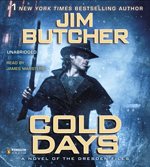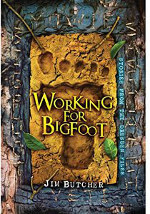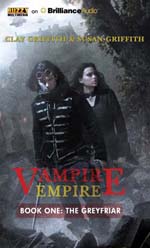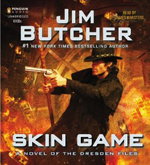
 Cold Days: A Novel of the Dresden Files
Cold Days: A Novel of the Dresden Files
By Jim Butcher; Read by James Marsters
Publisher: Penguin Audio
Release Date: November 27, 2012
ISBN: 9781611761603
Playing time: 19 hours [UNABRIDGED]
Themes: / fairy / wizard / urban fantasy / near-death /
Publisher summary:
After being murdered by a mystery assailant, navigating his way through the realm between life and death, and being brought back to the mortal world, Harry realizes that maybe death wasn’t all that bad. Because he is no longer Harry Dresden, Chicago’s only professional wizard. He is now Harry Dresden, Winter Knight to Mab, the Queen of Air and Darkness. After Harry had no choice but to swear his fealty, Mab wasn’t about to let something as petty as death steal away the prize she had sought for so long. And now, her word is his command, no matter what she wants him to do, no matter where she wants him to go, and no matter who she wants him to kill. Of course, it won’t be an ordinary, everyday assassination. Mab wants her newest minion to pull off the impossible: kill an immortal. Beset by enemies new and old, Harry must gather his friends and allies, prevent the annihilation of countless innocents, and find a way out of his eternal subservience before his newfound powers claim the only thing he has left to call his own…His soul.
After a slight departure from normal Dresden Files form in the preceding Ghost Story–owing to Harry’s (near) death and all–Dresden returns to corporeal form in Cold Days. But he can’t expect a warm welcome, even from his closest friends, because he’s now fulfilling his service as Winter Knight to Mab, the fairy Winter Queen. And this novel manages to raise the stakes again, for Harry, for Chicago, for the world. There have been so many Dresden Files novels now they actually fall into categories: there are vampire novels, fairy novels, wizard council novels, undead novels, and so forth. As the series grows there is more and more crossover, but Cold Days easily qualifies as a fairy novel.
I have two equal and opposite reviews in mind for Cold Days, and instead of choosing which to write, I’ll write both.
The first review argues that Cold Days, the fourteenth installment in the Dresden Files, suffers from serious series fatigue. With a few exceptions, it features largely the same cast of characters, the same locales, and the same themes that readers have grown accustomed to. Despite some glimpses of growth, development, and transformation, Harry Dresden is largely the same smart-mouthed, down-on-the-heel practicing wizard he was in Storm Front. His all-too-frequent pop culture references that once seemed amusing now strike a chord of annoyance. The frenetic action sequences that a few novels ago felt exhilarating now come off as trite and paint-by-numbers. In short, the novel makes me feel as if my once solid relationship with The Dresden Files has fallen a bit flat.
Some of the problems present in Cold Days are inherent in the stagnant conventions of urban fantasy as a whole. Except for a few quick jaunts to Edinburgh or Mexico, the entire series has largely taken place in Chicago. While Aristotle’s unity of place might be best practice for a play or even a novel, it certainly doesn’t work for a series of this length. This reader, at any rate, longs to see the heroes face other challenges in far-off lands. Worse, the single, small, isolated locale undermines the severity of the universal threats posed by the series’ villains. It’s difficult to take seriously a dangerous entity bent on world destruction when the only destruction in evidence takes place within a few city blocks.
With all the storylines introduced over the course of thirteen previous novels, it’s inevitable that not all of them can be picked up or carried along in a sequel, nor should they be. However, a pretty major development took place in book 12, Changes, prior to Harry’s apparent death, that is surprisingly absent from Cold Days, even in Harry’s continuous flow of internal monologue. He makes oblique references to it a few times, but I’d hoped that particular surprise would herald a shift in the series rather than merely the plot for a single novel. It is to be hoped that Jim Butcher will pick up this important thread in future novels.
The other review in my head praises Cold Days as a worthy installment to the Dresden Files series. This is largely on account of Jim Butcher’s vigorous writing style and strong characterization. Pop culture reference overload notwithstanding, Butcher’s writing, like a fine oak-aged whiskey, has only improved with age. Though the action sequences as a plot device are overused, there’s no denying they’re well-written. There’s a knock-down drag-out bar fight early in the novel, and you really can feel every shotgun blast and flying bar stool. The witty, flippant language that jaunts through the novel makes the few moments of gravity or pathos all the more powerful. There’s an exchange between Harry and his friend/love interest (to quote Facebook, “it’s complicated”) Karin Murphy that’s poignant and dramatic enough you’d expect to find it in a Scorsese flick.
And while Harry Dresden himself might wear thin at times, the host of supporting characters still haven’t lost their charm and complexity. Harry’s half-brother Thomas, his apprentice Molly, and polka-infused Medical Examiner Butters all make welcome and notable experiences. These characters crackle with life, personality, and possibility. For me, fantasy and science fiction novels, however wonderful their locales and however revolutionary their ideas, are only as strong as their characters. In a series of this length, the importance of characters increases exponentially. And even if some, including the protagonist, rub me the wrong way at times, they’re still characters I know and care about.
So, two equal and opposing reviews–how to break the tie? Simple: will I read the next Dresden Files novel? The answer is a definite yes. I don’t say this lightly. It takes a lot to keep me, and probably most readers, invested in a long-running series, especially in a sub-genre I don’t usually read. (Incidentally, the fact that I don’t often enjoy urban fantasy means you should take my first, negative review with a pinch of salt.) I bowed out of Robert Jordan’s Wheel of Time series after book seven, and I put down Charlaine Harris’s Sookie Stackhouse novels after the third installment. Blasphemous as it sounds, I’m even losing patience with George R. R. Martin’s A Song of Ice and Fire. Yet through thick and thin I’ve stuck with The Dresden Files for fourteen novels filled with great characters and complex supernatural elements. And I’m eager for a fifteenth.
The audio edition marks the return of James Marsters, best known as Spike from the Buffy the Vampire Series TV series, as narrator. Ghost Story, the previous novel, was narrated by John Glover. I feel sorry for narrators who have to pick up a series mid-stream, like John Lee who stood in for Roy Dotrice in narrating George R. R. Martin’s A Feast for Crows. John Glover performed admirably in his reading of Ghost Story, and if he had read the series from the beginning there would have probably been no cause for complaint. But for the previous twelve novels, James Marsters was Harry Dresden. His dry, sometimes deadpan style perfectly fits the Chicago detective noir tone of the novels. So his return to the series is a welcome breath of fresh air. Also, major props to Marsters for hitting the sustained high notes in the dialogue of the minuscule fairy underlings.
Posted by Seth

 Working for Bigfoot: Stories from the Dresden Files
Working for Bigfoot: Stories from the Dresden Files The Kingmakers (Vampire Empire #3)
The Kingmakers (Vampire Empire #3) The Rift Walker (Vampire Empire #2)
The Rift Walker (Vampire Empire #2) The Greyfriar (Vampire Empire #1)
The Greyfriar (Vampire Empire #1) Skin Game (Dresden Files #15)
Skin Game (Dresden Files #15)